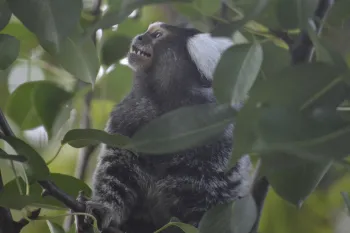MURCHISON, Texas—Before arriving at Humane World for Animals’ sanctuary Black Beauty Ranch, a marmoset named George had a lonely existence as someone’s “pet,” kept caged in a Wisconsin basement. Authorities responded to a complaint that a primate was not receiving proper care and confiscated him. Black Beauty Ranch stepped up to provide him with lifetime care, where he joined Cali a marmoset who was surrendered to the sanctuary by her previous owner in Florida who realized that she needed more space.
Marmosets are social, wild animals who require interaction with others of their own species. Now, 3-year-old George and 7-year-old Cali share their large natural habitat at the sanctuary where they can spend the rest of their lives expressing their natural behaviors, such as climbing trees, leaping from branch to branch and hanging upside down.
Sue Tygielski, senior managing director of Black Beauty Ranch, said: “Cali and George adjusted well to their life together. Cali is confident and curious about George, whose biggest delight in the day is finding and eating mangoes—his favorite treat. We often see them grooming each other, which is a good sign as they build their bond and companionship as they would in the wild. Marmosets, like all primates, are extremely intelligent with complex social and physical needs. Kept alone as pets, they are denied the necessary mental stimulation, social partners, exercise and proper nutrition they require. Cali and George are the lucky ones who never have to be confined as someone’s pet again and can finally be the wild animals they deserve to be.”
Marmosets, native to South America, are a forest-dwelling species who live in small troops of closely related members who work together to raise their young. They are busy in their native habitats foraging for food and hunting insect prey. In the U.S. pet trade, infants are pulled from their mothers shortly after birth—a cruel and unhealthy practice that can lead to lifelong physical and psychological problems and even death.
Laura Hagen, program director of captive wildlife for Humane World for Animals, formerly called the Humane Society of the United States, said: “While some primates are taken from the wild in their native range for the global pet trade, most primates kept as pets in the U.S. come from dealers who profit from the cruel treatment of animals, separating mothers from their babies and selling the infants as pets. This places both animals and the public in severe danger. While lax state and federal laws make it impossible to know exactly how many primates are kept as pets in the U.S., we believe the numbers continue to be on the rise, fueled by social media and public encounters with primates. These mislead the public to believe these wild animals make for great pets, which couldn’t be further from the truth. Breeding, selling, buying and keeping primates as pets is deplorable and a recipe for disaster.”
A federal bill, the Captive Primate Safety Act (H.R. 3199/S.1594), would address this problem by prohibiting private ownership of nonhuman primates as pets throughout the U.S.
Keeping primates as pets is cruel and poses serious public safety concerns. They are incredibly strong and can become aggressive, dangerous and unpredictable. Even smaller species like marmosets can inflict serious injury. According to data compiled from government records and news reports by Humane World for Animals, more than 340 dangerous incidents—primarily attacks and escapes—involving pet primates in the U.S. have occurred since 2000 in 42 states, resulting in injuries to at least 215 people, including at least 76 children, and the deaths of almost 40 primates. At least 28 of these incidents involved marmosets.
Marmosets kept as pets have escaped their homes, bitten neighbors and visitors, and have jumped on and bitten bystanders when owners took them on public outings. They have also bitten first responders and been seized by law enforcement executing search warrants as part of animal cruelty cases, like George before coming to Black Beauty Ranch. Primates have been found dead in hot cars, dehydrated and with fractures and other evidence of past trauma. In addition, like all primates, marmosets can spread viral, bacterial, fungal and parasitic diseases that pose serious health risks to humans. People handling marmosets may be at risk of contracting infectious diseases such as shigella, salmonella, cryptosporidium and giardia.
George and Cali are not the only primate residents at Black Beauty Ranch who came from the pet trade. Macaques Magilla, Ember and Miya, and capuchins Phoenix and Jackie were also former “pets” before they were lucky enough to be rescued and live the good life at the sanctuary.
As an accredited sanctuary, Black Beauty Ranch uses a variety of appropriate ways to prevent reproduction of its animal residents.
Black Beauty Ranch is one of America's largest and most diverse animal sanctuaries. Part of Humane World for Animals, formerly called the Humane Society of the United States, the 1,400-acre Texas sanctuary provides a permanent haven to nearly 600 domestic and exotic animals – 42 species - rescued from research laboratories, circuses, the pet trade, roadside zoos and other circumstances of neglect and cruelty. Residents include tigers, bears, primates, kangaroos, bison, horses, farm animals and more. The highly respected sanctuary is accredited by the Global Federation of Animal Sanctuaries and is a member of the Big Cat Sanctuary Alliance and the North American Primate Sanctuary Alliance.
#
